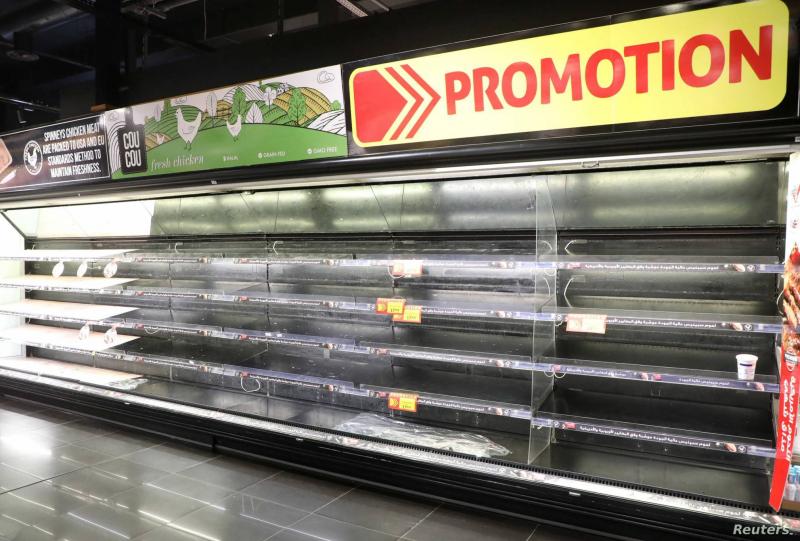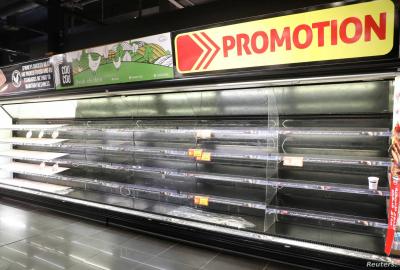Lebanese people refer to September as the "M" month, due to the various annual obligations that start with this letter, most notably the community's preparations for winter and its requirements. Traditionally, in September, Lebanese families secure winter fuels for heating, school supplies for their children, and most importantly, prepare their annual provisions such as "makdous," pickles, jams, and "maamoul."
Elderly people conclude their stories about the "M month" by highlighting a greater need during this time, asking, "What does it require that starts with 'M'?" The answer that younger generations often cannot pinpoint is "money," which Lebanese people save throughout the year to meet the demands of this month.
However, Lebanon is facing its second year of an unprecedented economic crisis, as noted by the World Bank. The crisis has intensified this year, peaking with the collapse of the national currency that pays most Lebanese salaries, leading over 80% of the population to suffer from multidimensional poverty, according to the latest reports from the "ESCWA." There has been a significant discrepancy between incomes and the prices of goods and essentials, closely tied to the exchange rate of the dollar, which soared from 1,500 lira two years ago to over 20,000 lira now.
Money has become a scarce element, making it a fundamental requirement to secure everything mentioned above for winter. After the massive disorganization disrupting the start of the school year in Lebanon and the considerable difficulties for families in securing heating supplies amid a fuel shortage and skyrocketing heating costs, it seems that the collapse will crush the third "M" of the month: the provisions that have long served as a refuge for the poor and a guarantee of their sustenance through winter. Such provisions have over generations formed a cultural and social identity, anchoring customs and traditions that are now threatened with extinction along with food security for thousands of Lebanese families who depend on them for the cold season.
The supply process varies from one region to another in Lebanon based on geographical and agricultural conditions, resulting in different types of provisions and food items, with the only commonality being the inability of Lebanese families to secure them this season.
**Saving at the Expense of Health**
Um Salman owns a shop selling provisions and their basic ingredients. She confirms in her conversation with "Al-Hurra" that most residents of her town in Beqaa face difficulties in securing their annual provisions. "An employee or soldier earning one and a half to two million lira can no longer manage even a single monthly bill for their electricity generator or four jerry cans of gasoline; from where will they find the money for provisions? What is happening today is a systemic collapse; people are living day by day without thinking of tomorrow."
"The situation is extremely dire. Neither the poor nor the rich can afford the costs of supplies, which have multiplied about tenfold compared to previous years," says Um Salman, who has noted through her work the magnitude of the crisis and its impact on citizens.
She adds, "People today are primarily searching for the cheapest options, no longer caring about quality or brand. All that matters is obtaining the desired item at the lowest possible cost; they are looking for the cheapest oil and dairy to feed their children."
Some according to Um Salman have started "scouring stores for food items nearing expiration dates to buy them at lower prices than available in the markets. Just a few days ago, someone asked me what to do with food items that are close to expiry because he was ready to buy them as long as they had not passed their expiration date by more than three months. People want to eat despite any health risks, and from this example, one can understand the reality the community is living."
**Credit is Forbidden**
One of the major obstacles to supplying is the halt of credit purchases in most Lebanese areas. Muhammad, a construction worker, was surprised this year when the shop he usually relied on stopped offering credit. His seasonal work has always necessitated borrowing throughout the year and paying off debts during the season.
"This year, we couldn't do that; there was neither an active season nor any other available work. For the first time in my life, I couldn't secure supplies. I might buy some ready-made provisions later if conditions allow, but for now, it's impossible due to the cessation of credit," Muhammad states.
Um Salman has also stopped offering credit in her shop, "Today, everyone operates based on their capabilities, and I am aware of how much employees and seasonal workers rely on buying on credit. However, I cannot record a debt of 100,000 lira and then buy the same goods tomorrow for 150,000 lira; the loss falls on me. Credit was feasible when prices were stable, but today it is impossible."
"Everything has changed," Muhammad remarks, "In these days, even people have changed, and I blame no one for that. The crisis we are experiencing has enforced these changes, and now everyone thinks in terms of 'me first,' with no room for blessings, kindness, or community cooperation. The provisioning season used to be a celebration where people shared their supplies and distributed excess to those in need; now it's a funeral where everyone cries and complains."
**Kishk to Leftovers**
"Kishk" is one of the unique elements of Lebanese provisions, particularly in the Beqaa and North regions, where women prepare it as part of their winter supplies, mixing bulgur with yogurt, kneading it, then drying and grinding it into a powder that can be dissolved in oil and water for cooking or in Lebanese "manaqish."
Once termed the food of the poor in winter and their source of energy against the cold due to its high nutritional value, today it has become a challenging item to prepare and acquire due to its soaring costs, which have increased about tenfold from past years.
Naimat, who owns a kishk mill, shares how the demand for her mill has drastically declined this year, "We have not seen the poor and low-income individuals this season; business has only been maintained with the well-off known in the area. Even these people have reduced the quantities they used to prepare annually; families that once needed 10 kg of kishk now suffice with 5, and so on."
She adds, "My work has shifted from sharing people's enjoyment of this season in preparing their supplies to a painful task, as I must listen to complaints about prices, inflation, the approaching winter, and costs. I hear heartbreaking stories and witness horrifying situations."
People used to anticipate the end of September and the dropping temperatures to prepare kishk, which could spoil in high temperatures, according to Naimat, but this year the season commenced early as people hurried to purchase what they could before prices surged again, indifferent to the timing of the season or the quality of the kishk.
Naimat continues, "People used to compete and boast about the quality of the kishk and the yogurt used and the raw materials from the first vendor. Today, the challenge is simply the ability to prepare kishk; no one uses goat or sheep's milk anymore, and even cow's milk prices have skyrocketed so much that I witnessed a family prepare kishk using powdered milk they received as food assistance, making milk for the kishk from it—a sight I had never seen in my life."
Among the hardest situations Naimat faced was when a family sought her help to obtain "khshana," the leftover skins from grinding kishk, which are usually discarded. Nowadays, people seek to acquire these and are not ashamed to ask for leftovers after grinding as they use them in mana'eesh to increase the quantity of kishk after kneading it.
The cost of preparing kishk has become exorbitant compared to previous years. Where a kilogram used to cost around 50,000 lira, it now costs about 200,000 lira. Naimat states that the prices of all raw materials have significantly risen, "Milk was once 6,000 lira per kilogram, last year it reached 18,000, and today it is 60,000. Similarly, bulgur has jumped from 1,500 lira per kilogram to 14,000."
The wages that Naimat charges for her services have also increased from 5,000 lira to 10,000. She says, "At the start of the season, I tried to keep my prices as they were because I own the mill and shop, and I only have to cover my electricity and my fees. However, I received an electricity bill at the beginning of the month worth 2 million lira, resulting in loss after loss, leaving me with two choices: to raise prices or close my business."
**Makdous for Expatriates Only**
Khadija, who specializes in preparing provisions for homes, asserts that she hasn't received any orders from locals in her town, "Most orders I received were from expatriates wanting to take some provisions with them, especially makdous, whose preparation entails significantly high costs relative to salaries in lira."
She adds, "May God help the people. The price of a small jar of makdous ranged from 20,000 to 30,000 lira; last year it reached 100,000 lira and now it stands at 400,000 lira. The prices of all raw materials have surged, especially walnuts, which used to sell for 12,000 to 20,000 lira per kilogram, and today it is priced at 150,000 lira, while eggplant's price soared from 1,500 lira to 6,000 lira. The cost of 4 liters of oil exceeds 150,000 lira, and that is not olive oil."
Khadija recounts an incident with a poor family to whom she donated 25 kg of eggplant, "They couldn't secure even one kilogram of walnuts. They bought half a kilogram of peanuts as a substitute for walnuts and to save on oil, they preserved the eggplant in sealed jars, planning to add the oil only when they eat it."
The same level of inflation applies to all types of provisions based on vegetables, such as pickling, where the price of cucumbers surged from 1,500 lira to 15,000 lira, and tomato paste, which jumped from 500 lira to 5,000 lira. Khadija states, "We no longer account for the costs of salt, water heating, or tomato pressing and transport; we now have to factor those due to rising prices. Without this, we'd be working for free without profits."
As for the provisions of grains and frozen vegetables, Naimat explains how families lost their winter stock due to power outages, forcing them to take their supplies out of refrigerators and use them before spoiling, a catastrophic scenario faced by many families that lost their provisions due to persistent electricity outages. They are now on the brink of winter, compelled to buy from markets at exorbitant prices.
**Jam Production Discontinued**
The steep rise in prices of sugar and fruit has hindered Lebanese from making jams, with sugar prices reaching 12,000 lira per kilogram. Meanwhile, the prices of figs and apricots have been exorbitantly high this year compared to previous years.
Khadija asserts that the jam market has turned into something akin to a black market, especially with the end of the fruit season typically used for jam-making, such as apricots, alongside rising market prices. Concentrated berry syrup that cost 20,000 lira is now at 80,000 lira.
Dried figs have reached around 50,000 lira, while the price of large jars of apricot jam approaches 100,000 lira, having become a nearly unattainable commodity due to damage inflicted on this year’s apricot season, particularly in Northern Lebanon, which saw swarms of locusts affecting apricot yields, driving prices up to 20,000 lira per kilogram.
Khadija concludes by describing the current inflation as "deadly," insisting that her description is not exaggerated given the people's condition who will be forced to procure their food from markets at astronomical prices that will undoubtedly exceed their financial capacities, which will subsequently affect the quality and quantity of people's food and their overall food security.




